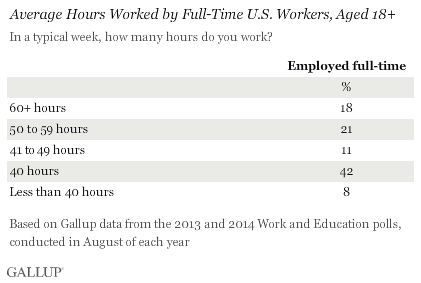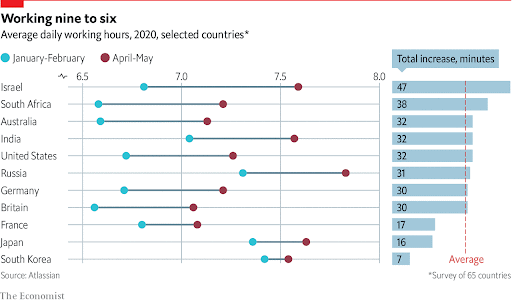How many times have you asked someone how they’re doing, only to have them respond: “Oh, I’m busy.”
How many times have you said it yourself?
The answer is no longer “Fine” or “I’m doing okay, thanks.” Nope. The standard answer is now just “busy!” When you think about it, busyness has nothing to do with wellbeing. But our society places a great emphasis on being busy. There’s a certain importance to being busy all the time in the Western world, especially for small business owners trying to do it all.
It’s a big contrast to predictions about the future of work in recent years. Knowledge workers, for example, have long been predicted to work less in the future and enjoy more free time. British economist John Maynard Keynes said that by 2030, people would work “three-hour shifts or a fifteen-hour week.” Likewise, Nobel laureate Bertrand Russell postulated that a 4-hour workday should be enough work for everybody.
In some ways, we’ve seen this come to fruition: companies around the world are experimenting with the idea of a four-day work week.
But the reality for many workers has turned out to be vastly different, especially in light of the pandemic. Research by Atlassian found that the workday slowly began to lengthen when the pandemic began as workers at home began to put more hours into the working week.

Photo: Gallup
Many workers and workplaces have begun worshiping the cult of busyness. It’s even easier to get there when you run your own business, and the tasks keep adding up. When does it end? Workers and business owners are praised for working late, replying to emails off-hours, and avoiding taking their vacation. But does all this extra work actually mean extra productivity? Or are we just subscribing to a broken system?
Busyness as a status symbol
Why does everyone aspire to be busy? In today’s Western world, contemplating being busy and working non-stop is so commonplace that nearly every modern worker has done it one time or another.
It’s long been the subject of research papers and philosophers. One Harvard Business Review analysis of hundreds of celebrities’ statements found that “having no life” or “desperately needing a vacation” are simply the new status symbol. Vacation is no longer the goal: busyness is.
In other words, when we tell people we’re busy, we’re sending a tacit message: we are in demand, we are important.
It’s not just about the demand either. Some people add things onto their plate because they fear being seen as irrelevant, especially at work. The introduction of social media didn’t help the process, either. We see people traveling the world, running from place to place, cooking dinner each night… People’s curated images all say the same thing, at the end of the day: I’m busy, and I’m important.
Does being busy mean being productive?
The cult of busyness operates under one common misconception: busyness does not equal productivity.
Many people – workers, specifically, will stack on extra hours at work, all in the hopes of being more productive. Studies have found that most U.S. workers will put in much more than 40 hours a week. That same study found that only 8% of workers work 40 hours a week or less.

Photo: The Economist
It’s not all about being busy. There are some key differences between being busy and being productive, a distinction many people don’t understand:
- Balance: Productive people will focus on creating more balance in their life instead of trying to do everything at once. You don’t want to just fill your schedule for no reason – you need some down time, too!
- Goals versus priorities: Busy people will often have many goals all at once, while truly productive people will have priorities. What is the difference? Priorities allow people to allocate their time to certain tasks and allow them to take steps to achieving their goals.
- Saying yes: Busy people keep saying yes. Productive people do not. Productive people will consider everything before jumping to say yes, because certain tasks will be worth their time – and others will not.
- Managing deadlines: Busy people tend to get things done just in time, but productive people will manage their deadlines and act accordingly. If you create realistic deadlines, you can force yourself to work with more purpose.

The connection between burnout and busyness
Mental health took a hit during the pandemic, all while many people took on more work than ever before. It can be difficult to maintain boundaries between work and life, especially when many people see work (and busyness, by extension) as the most important thing in their lives.
How many times have you heard people saying things like “rise and grind” or “hustle”? That mentality is so ingrained in our culture and our personal mentalities.
But there’s lots of evidence indicating that being too busy for too long may lead to burnout. In one McKinsey & Company survey in 2021, 42% of women and 35% of men reported feeling burnout often or almost always in 2021. That number is much higher than the 32% of women and 28% of men who reported feeling that way in 2020.
Another survey of employees in the U.S. found that employees suffering from burnout in 2021 are much less likely to respond to survey requests about said burnout – and the most burned out employees have probably already quit their jobs, especially amidst the Great Resignation. Of those who did answer the McKinsey survey, nearly half reported feeling burnout symptoms at work.

Burnout is not something to take lightly, either. Symptoms include a sense of self-doubt, detachment, loss of motivation, detachment, and more. These symptoms prevent people from living their best lives, especially if they continue to feel pressured to stay busy.
How can you break the cycle?
So many people feel trapped in a cycle: more tasks, more busyness. But there are steps to take to better organize your life and take back control of your day-to-day life.
The key? Simplicity and focus.
Remember, productive people have short, focused to-do lists. Consider outsourcing some tasks to others, or simply striking them off the list all together.

Here are some more tips to decluttering your life:
- Focus your to-do list and identify the highest priority and lowest priority
- Check in with yourself: do you really need to take on this new task?
- Aim for technology-free times during the day
- Create (and stick with) working and email hours each day
- Understand your circadian rhythm and plan your day around it – don’t feel the need to wake up early if it doesn’t work for you.
- Avoid unhealthy props to keep yourself going, like too much caffeine or too much sugar to give yourself energy
It’s never easy to tear yourself away from a busy lifestyle! Having free time, taking your vacation, and setting work/life hours simply isn’t the norm in our society. But setting these boundaries can help you settle into a more relaxed and more balanced lifestyle. Our advice? Start by trying saying “no” a little more and see where that takes you 😉




